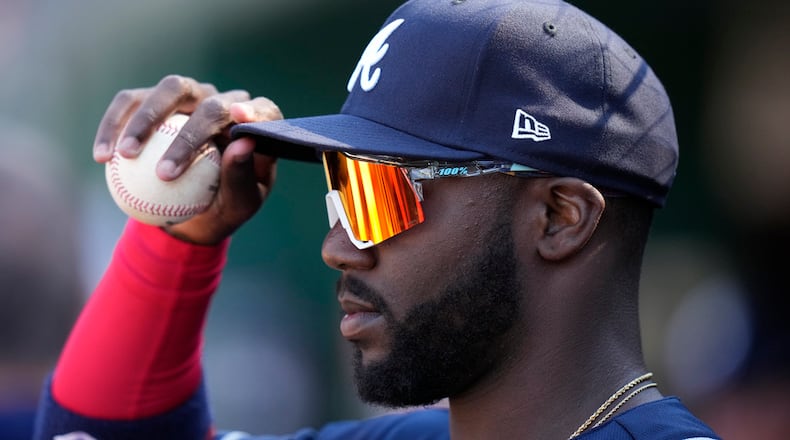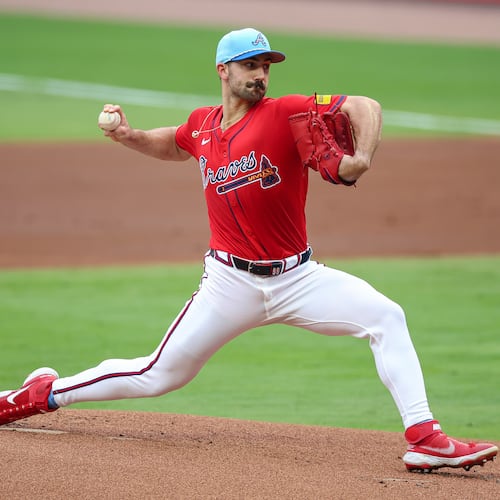KANSAS CITY, Mo. — In the visiting clubhouse at Kauffman Stadium on Saturday, the Braves’ road gray jerseys hung in each locker, ready for the game.
All featured a blue No. 42 on the back.
Saturday is Jackie Robinson Day around MLB.
“It means a lot,” Michael Harris II, who is Black, said Saturday. “I wouldn’t be able to play this game that I love every day without him. It sucks that I’m not gonna be out there on the field wearing the ‘42.’ But I still recognize him each day.”
This was Harris’ first time experiencing Jackie Robinson Day in the major leagues. At this time last year, he was at Double-A. Unfortunately, he’s on the injured list with a lower back strain and won’t patrol center field in the No. 42 uniform.
But this day – Jackie Robinson Day always is April 15, the date Robinson made his debut – gave Harris a chance to reflect.
“He went through a lot. Everybody knows that,” Harris said. “He just never stopped. He wanted to do what he wanted to do. He did that and allowed us the chance to be able to play this game. I feel like all of us African-American players are grateful for that.”
More important, Harris wants to carry this impact forward and set the example for those younger than him. According to a study conducted by USA Today, only 6.1% of players on this year’s opening-day rosters were Black, the smallest percentage since 1955.
“Yeah, I think the same way that Jackie did it, I have to go out there and show them that it’s possible,” Harris said. “The numbers are down right now in the percentage of (Black) players in the league. I know a good amount of people that are still playing that are African-American that have the talent to be able to do it. It’s just, I guess, the opportunity and just making the most of that opportunity.”
Last year, the Baseball Writers’ Association of America selected Harris as the Jackie Robinson National League Rookie of the Year. The award was extra special for Harris because it came with Robinson’s name. “He’s the reason why I’m able to play this game,” Harris said.
Harris grew up in metro Atlanta. He played on a predominantly Black baseball team when he was younger. Now, he wears a Braves uniform, something that can inspire the younger generation.
“Just being able to see that was possible,” Harris said, “I guess it can help a lot of kids.”
Wright focusing on mental habits
Kyle Wright never had been hurt. So when he received a cortisone injection in his right shoulder in January, his focus – from then until recently – has been on ensuring his shoulder is healthy and feels good. This had unintended consequences.
“I think it was good that I was able to focus on that because I’m back now, I’m ready to pitch, but I think at the same time, probably neglected a few things,” Wright said. “Just kind of some of the mental stuff, the routine, just kind of going over that stuff.”
This isn’t a bad thing. If you think about it, how could the health of his shoulder not have been at the front of Wright’s mind? Of course it was. This was his first experience with missing time because of an injury.
His shoulder should have been his main focus.
But now, he can begin working in other habits.
For one, he’s big on imagery.
“Putting yourself in situations before it happens, just so it doesn’t feel foreign once you get there,” he said.
He’s worked on this with Zach Sorenses, the Braves’ mental performance coach. Sorensen also has given Wright other helpful tips.
“Just using your breath. That’s a big thing in our game,” Wright said. “It’s gotta be intentful and purposeful. It can’t just be a quick breath, just to say I did it. You have to make sure you’re fully getting that breath, resetting. It’s really, really small stuff, it’s not anything crazy. But it’s amazing what those small things can do for you within a game and how much success it can actually help you have.”
As he rehabbed his shoulder, then progressed through the steps of his throwing progression, Wright didn’t think much about everything else that comes with pitching. He just wanted to get back and feel good.
He will start again Sunday, five days after allowing four earned runs over three innings in his season debut.
“In this game, the most important thing is your health because if you’re not healthy, you can’t play. I think it was well served to be focused on it,” Wright said. “But there are just so many things in this game that you don’t really think about unless you’re in the situations. That’s offensively, defensively, hitting, coaching, whatever it may be. So I think that kind of getting myself back immersed into a game and kind of experiencing those things and now having things I can focus on and work on, be better prepared for, is good.”
Ideally, this – Wright getting hurt and missing time – never will happen again …
“But if it does, I have a better idea of how to still attack things, and make sure I’m prepared and ready to go,” he said.
Fewest ABs to 100 homers in Braves history
We’ll start with a shoutout to Jonathan Kerber, the Braves’ former public relations man, who now is the director of team travel. He compiled the list you’ll see below.
The tip of the cap goes to him, because it can be ridiculously difficult to dig up certain lists and statistics, despite the wide range of resources we use today.
Here are the Braves players who needed the fewest at-bats to reach 100 home runs.
Eddie Mathews – 1,442 at-bats
Ronald Acuña Jr. – 1,452
Bob Horner – 1,491
Fred McGriff – 1,549
Ryan Klesko – 1,569
Austin Riley – 1,715
Hank Aaron did it in 2,123 at-bats.
About the Author
Keep Reading
The Latest
Featured



